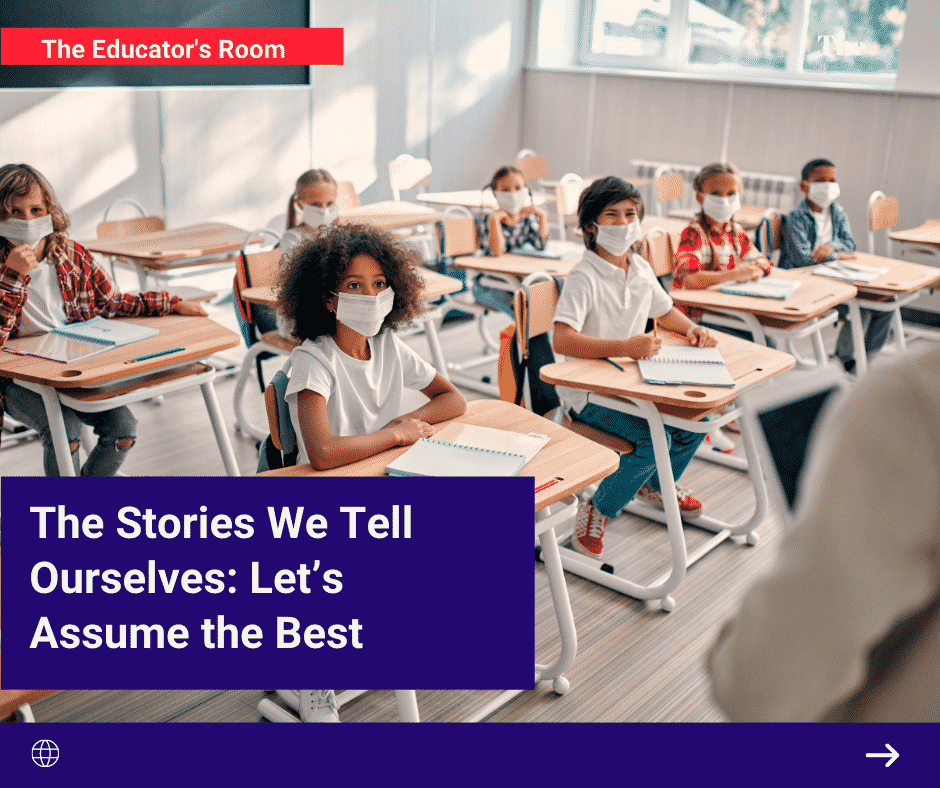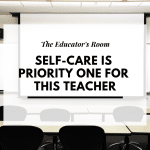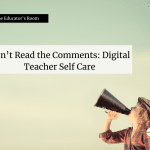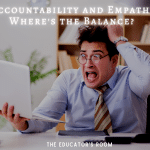We (yep, all of us) are stressed.
Students are swamped with work and desperate loneliness.
Parents are at their wits’ end trying to keep their jobs, kids, and sanity afloat.
Teachers are exhausted from the literal and emotional headache of online learning.
Administrators are trying to balance the needs of their staff and students while also answering district demands that often aren’t in alignment with their building’s needs..
As we turn the corner on one full year of online learning, I’m seeing a lot of understandable anger, fear, and desperation. But, I’m also seeing a lot of finger-pointing and not a lot of assuming best intent.
Let me be clear, we should all be pointing some very warranted fingers. For starters:
Teachers’ lives are being put at risk.
As a profession, teachers are mistrusted and undervalued.
Standardized testing is barreling through as if we weren’t in a pandemic.
Learning loss is being weaponized against educators, as if our systems weren’t already unequal to begin with.
But when it comes to our own learning communities, and especially our students, I wish we’d all first ask ourselves, “what is the story I’m telling myself?” before jumping to conclusions.
Stormy First Drafts
In Brene Brown’s book, Rising Strong, she calls the stories we tell ourselves (or the stories we makeup, SMU) stormy first drafts. When we don’t have all the information, we often jump to the worst case scenario.
As Brown says, “Storytelling helps us all impose order on chaos—including emotional chaos. When we’re in pain, we create a narrative to help us make sense of it.”
These kinds of assumptions are natural. If there were ever a time when humanity collectively felt the need to “impost order on chaos,” this is it. So, it’s no wonder that I’ve heard many stories about members of our community that come from a deficit mindset.
When a student…
- Doesn’t have their camera on: “They aren’t even in class, they’re just blowing it off because there are no consequences.”
- Asks for an extension: “I gave them plenty of time, I can’t take late work right now.”
- Is just a blinking cursor on a document: “They aren’t even trying.”
- Doesn’t come to office hours: “They don’t want my help and don’t care about passing.”
When admin…
- Change the grading scale: “Students are just getting a free pass for not doing the work.”
- Prepare for hybrid learning: “They don’t care that we are scared and unvaccinated.”
- Gives a PLC reflection task: “They just keep giving us more pointless work.”
I know that, at my worst, I’m guilty of this kind of thinking too. I am so tired of teaching 27 black squares every day. Keeping up with the seemingly constant stream of late work is nearly impossible. I miss the energy and purpose my job used to give me everyday.
But, when I let the stress creep in and author those stories, even for a moment, I am not treating my students or other professionals in my community with the same kind of empathy and grace that I hope they’d extend to me.
Reality Check
In reality-checking the stories we tell, Brown gives some guiding questions to really highlight the difference between what we assume and what’s really true.
For example, a few weeks ago, a student who I rarely saw came into zoom. Let’s call him Will. Will had a 1% in my class and even on the occasional times I’d “see” him, he would give an excuse about why he needed to leave and sign off shortly after our class check-in.
On this day, he frantically started populating the private chat. He thought he was going to fail out of school, no one was there for him, and he just was ready to give up. I tried my best to respond to what he was saying with care. I asked him if he had been coming to school to use the internet (and truly, all-around support) cafe. He said he wasn’t at school and then, shortly after typing a string of frustrated expletives, he left.
Here, it was easy for me to jump to conclusions. To tell myself the story Will was disrespectful or that he didn’t take my sincere offers of help. After checking in with his counselor, I tried to shake off the interaction and keep the rest of the class moving.
But, about an hour later, I heard a knock at my classroom window, and there was Will, chest-deep in wet bushes mouthing “I made it!” before running off to the internet cafe in the cafeteria.
Turns out, as soon as he’d logged out of our class meeting, he had hopped on his bike and rode on the highway to try to make it to school. He biked for a half an hour (again, on the highway!) before some kind person stopped and gave him a ride the rest of the way.
Running this situation through Brown’s question prompts:
- What are the facts, and what are my assumptions?
The only thing I knew was that Will left class early after typing some pretty frustrated and not school appropriate feelings in the chat. The story I told was that he didn’t want my help and chose to ignore me.
- What do I need to know about the others involved?
He was trying his absolute best. Period.
- What am I really feeling? What part did I play?
I felt tired and helpless to actually change anything in his situation while I still needed to teach another 26 students through a screen. My state of mind played into my limiting assumptions.
Their Story to Tell
In reality, his frustration was genuine, and, as with most Stormy First Drafts, not about me. In fact, he wanted help so much that he braved biking on through traffic just to get support at school.
The most important part of this reflection for me is number 2; all I really needed to know about Will is that he was doing his very best.
As one of our brilliant school counselors often points out, we shouldn’t need to know each student’s story in order to have empathy and compassion. They have their own stories to live and tell, just as we do.
I didn’t need to know why Will hadn’t been coming before, why he didn’t have a ride, or why he was so frustrated. We shouldn’t have to unearth our student’s trauma in order to extend our grace and support.
What if we just assumed all of our students don’t have internet and would have to bike on the highway through the rain? What if our first instinct was to always assume the very best?






